A pro-LGBTQ movement in the United Methodist Church eyes future after conservative exodus
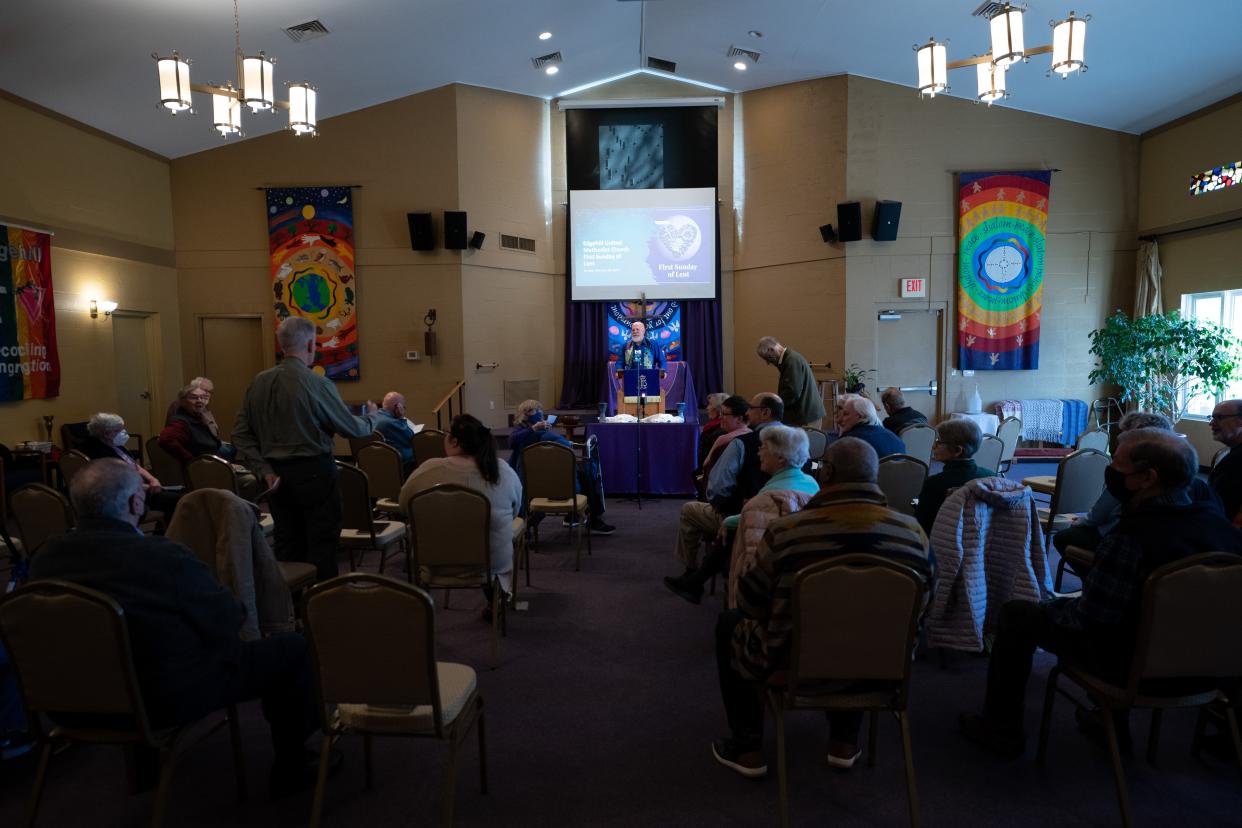
Edgehill United Methodist Church in Nashville embraced LGBTQ+ people, mobilizing its members to help build a national movement in the denomination.
“Our mission at that point was to say, ‘How do we survive no matter what the institution says?’” the Rev. Beth Richardson, a queer woman and ordained United Methodist elder, said in an interview. “’How do we stay in ministry with queer people?’”
Around the time Richardson joined Edgehill UMC as a member in the late 1970s, the church had lent its building to the gay-affirming Metropolitan Community Church to use for Sunday evening worship and to families of AIDS victims for funerals. Later, it extended communion to transgender people as early as the 1990s.
Hospitality to the LGBTQ+ community was an extension of Edgehill UMC’s inclusive mission, inspired by the church’s founding in 1966 as one of the first intentionally racially integrated churches in the Nashville area.
“Edgehill was the model,” said longtime member Kathryn Mitchem, referring to what became known as the Reconciling movement, which seeks to empower LGBTQ-affirming churches in the UMC. Mitchem and Richardson were part of a national task force that birthed the Reconciling movement in 1984, and Richardson co-wrote the guidelines for churches to officially join.
Edgehill UMC was the first United Methodist church in the South and among nine nationwide to join that inaugural year. Forty years later, as the nation’s largest mainline Protestant denomination navigates a historic splintering, there are more than 930 Reconciling congregations.
The largely Nashville-based UMC lost a quarter of its total churches between 2019-2023 following disagreements over theology and church policy, including dealing with LGBTQ+ rights. Many of the churches that left, or “disaffiliated,” are joining a more conservative breakaway denomination called the Global Methodist Church.
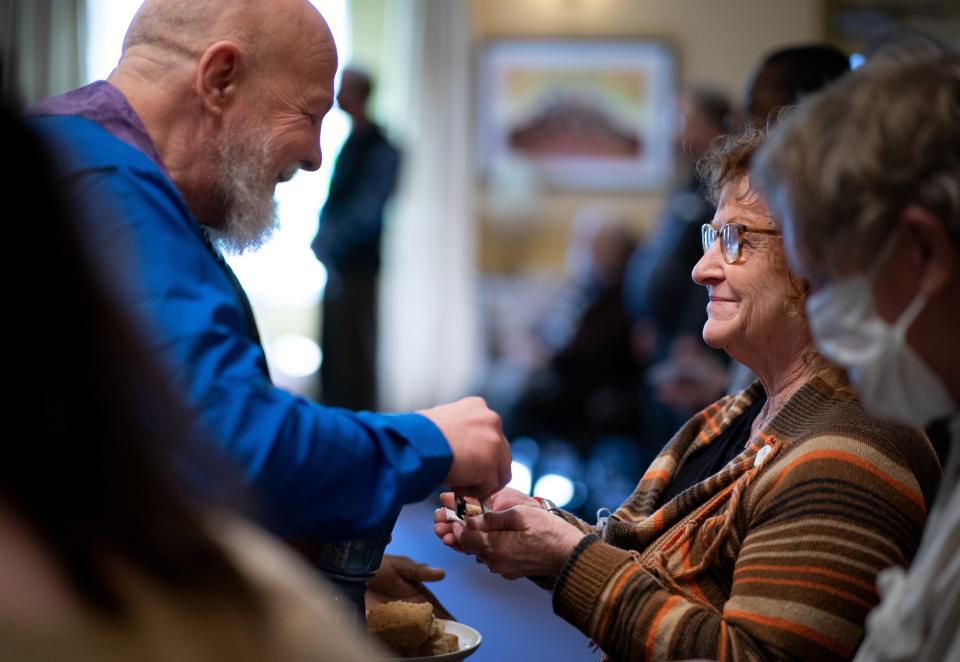
These departures increase the likelihood the denomination’s top legislative body, the UMC General Conference, will decide at its assembly in Charlotte in April to remove restrictive policies against LGBTQ+ people.
“So many conservatives have left, so they’ll clearly have the votes,” said Mark Tooley, a leading conservative Methodist strategist.
Leaders in the Reconciling movement are leerier to predict a precise outcome, partly due to its history of legislative defeats at the UMC General Conference, which meets every four years and includes delegates from across the world. But the posture of those progressive leaders also emphasizes more than just policy change and instead on how the Reconciling movement can inspire deeper cultural change often through other means.
That latter goal stems from the movement’s past success — by building support at the local level amid challenges at the UMC General Conference — and acknowledgement of future limitations.
“Our work is to make churches safe places for LGBTQ people to go. You can change policy and discipline all day long and that does not change,” Jan Lawrence, executive director of Reconciling Ministries Network, the nonprofit overseer of the Reconciling movement, said in an interview.
Conservatives have long warned their mass exodus from the UMC will result in a liberal free-for-all, drawing comparisons to the Episcopal Church, Presbyterian Church (U.S.A.) and other liberal mainline Protestant denominations. Lawrence rejects that notion, partly because many centrists didn’t leave the UMC.
Also, in the face of unique international circumstances, the Reconciling movement is backing a UMC General Conference proposal called “regionalization” to give United Methodists outside the U.S. more autonomy, for example, to maintain more conservative policies on LGBTQ+ rights.
The goal is "to build a more equitable and just church," Lawrence said. “I think this is the moment that we put a stake in the ground and start the future.”
Reviewing big-picture of splintering: The most consequential year in UMC split leaves uncertainty, new horizons. Here's how
‘It’s going to take 50 years’
Edgehill UMC defied anti-LGBTQ+ resistance in crafty ways, such as when it commissioned a study and written response to the regional UMC legislative body following an attempt to block funding to Edgehill UMC for hosting Metropolitan Community Church.
“This principle of ministry to all persons and the refusal to cast out anyone who comes to us for Christian ministry has been at the very heart of Edgehill Church,” said Edgehill UMC in that response, according to the book “Pushing Life: Edgehill’s First Quarter Century.” “To compromise this principle would be … inconsistent with the whole historic thrust of our ministry.”
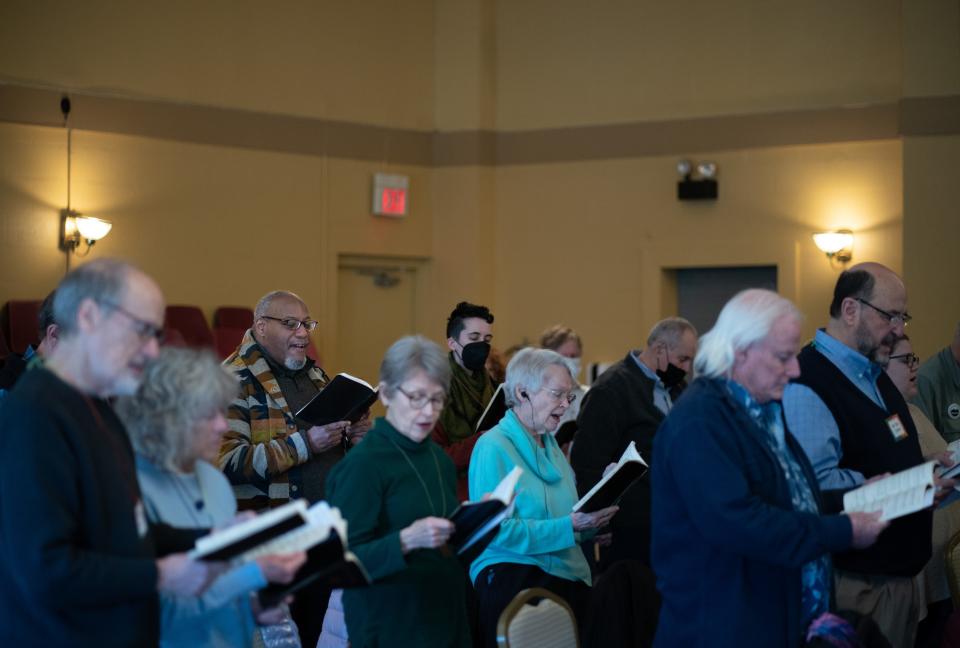
Edgehill later showed the same spunk when it barred all weddings in its sanctuary to protest restrictions on United Methodist churches hosting celebrations for same-sex unions.
“The majority of the congregation were organizers and none of us were ever timid,” Mitchem said. “It was, ‘we will be who we will be and will witness to who we want.’”
That sentiment informed Richardson’s approach to drafting the Reconciling movement’s foundational guidelines. She said their mindset at the time was: “How do we make that safety net that’s going to hold folks as we’re waiting for officials to change the UMC Book of Discipline?”
Until those changes, Richardson said church historians told them, “It’s going to take 50 years.” And that prediction proved accurate.
“They (progressives) never won a major victory,” Tooley, president of the Institute on Religion and Democracy, a conservative advocacy group, said in an interview. “The (conservative) votes were never lost on sexuality.”
The Institute on Religion and Democracy and other similar groups were part of a well-funded and media savvy coalition that endorsed traditionalist stances and policies at the UMC General Conference.
“All of the differences that divided conservatives … were melted down into the issue over sexuality, so everything else was subordinated to that,” Tooley said. “It was the chief battle flag issue.”
Building on revised social principles approved by the 1972 UMC General Conference — saying homosexuality is “incompatible with Christian teaching” — conservatives scored key legislative wins in 1976, 1984 and 1996. At other UMC General Conferences, they successfully reaffirmed and reinforced prior traditionalist policies or rejected progressive counterproposals.
But at this year’s UMC General Conference, the first since before the COVID-19 pandemic, Tooley expects success for progressive proposals against anti-LGBTQ+ policies, such as bans on the ordination of LGBTQ+ people and prohibitions on UMC clergy or churches blessing same-sex unions.
Dialogue amid differences = growth
Reconciling movement leaders are less explicit with their legislative predictions, an attitude those leaders say is based on a less political view of relationships in the denomination.
“Those of us on the reconciling ministry side have come to a much broader sense of how God is at work in the world,” said the Rev. David Meredith, a retired Ohio pastor and Reconciling Ministries Network board chair. “And it’s not solely based in who has the power and who doesn’t.”
Meredith, whose marriage to his husband in 2016 preceded conservative-led attacks and his bishop in Ohio pursuing disciplinary charges, sought to distinguish the Reconciling movement’s outlook from that of conservatives like Tooley. The latter views relationships in the denomination through a lens of factionalism.
“We cannot assess the future of the church based on our own inclusion alone,” Meredith said.
Since its earliest days, the Reconciling movement has encouraged dialogue amid differences both within an individual congregation and between congregations.
When Edgehill UMC went through the process of becoming a Reconciling congregation, its leaders offered special listening sessions for congregants who were on the fence, according to the book “Pushing Life: Edgehill’s First Quarter Century.” Richardson said some of those families ultimately left, but in an amicable way.
Edgehill UMC leaders then met with neighboring United Methodist churches and emphasized the importance of consensus.
“If it’s a close vote, the worst thing you could do is proceed because you just divided the congregation,” said the Rev. John Feldhacker, Edgehill UMC’s current pastor. “It can do harm. It’s not about doing harm to the body of Christ to win.”
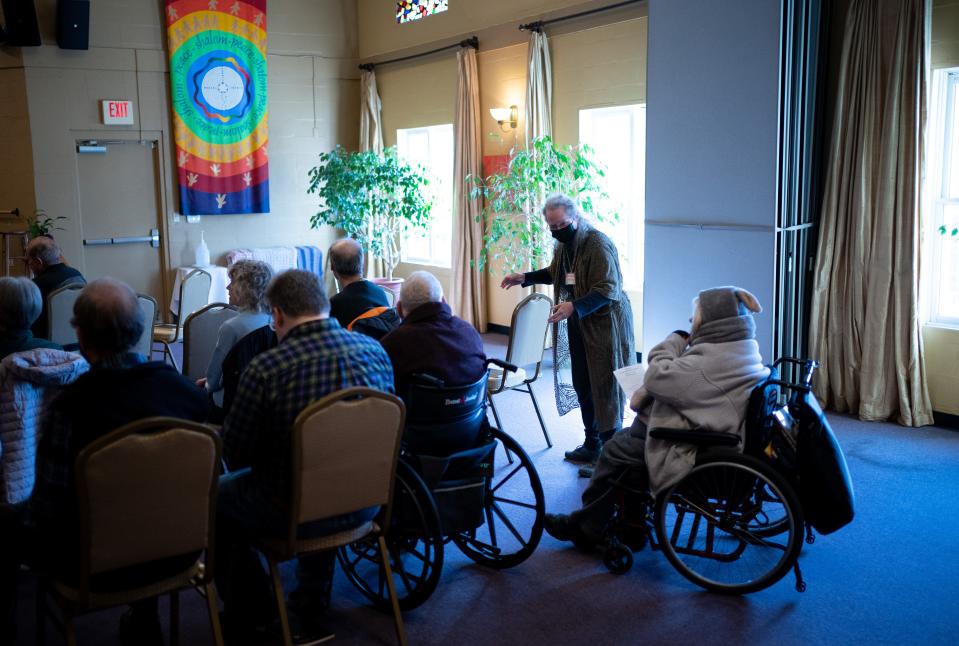
Feldhacker transitioned to his current post after pastoring at West End UMC in Nashville, which currently has ties to Reconciling Ministries Network but is not an official partner. Hobson, East End, Belmont, Glendale, and Blakemore United Methodist churches in Nashville are also Reconciling congregations.
Deen Thompson, a longtime Edgehill UMC member who was part of that delegation to neighboring United Methodist churches, recently attended a meeting of representatives from area Reconciling congregations. Thompson said he told those attending, “When I look around this group, you are the grandchildren of Edgehill.”
Other UMC splintering trends: Why the debate on whether to leave can be more intense among suburban UMC churches
Trickle-up change
In addition to neighboring churches, Thompson found receptiveness to the Reconciling movement’s message at the yearly meeting for the regional UMC legislative assembly.
At the yearly meeting for the regional UMC authority, called an annual conference, Thompson helped organize an unofficial gathering for Reconciling Ministries Network partners and those who were interested in learning more about becoming partners. Thompson also pushed for LGBTQ-inclusive policies during official business proceedings of those yearly meetings.
Thompson’s advocacy paid off, as evidenced by his election as the first openly gay man by his annual conference — the Tennessee-Western Kentucky Conference — to serve as a reserve lay delegate at the jurisdictional conference, which is the next highest level of UMC authority.
This sort of trickle-up effect happened throughout the UMC. It led to the ordination of LGBTQ+ ministers in some annual conferences and the election of two openly gay bishops in the Western Jurisdiction, despite prohibitions against both.
“There’s this integration that’s happened where Reconciling Ministries Network is not this outside agitator trying to get into the institution,” said Derrick Scott III, who leads campus ministries in Florida and a Reconciling Ministries Network board member. “Reconciling Ministries Network is now a broker at the table.”
Other messiness with UMC splintering: Splinter explainer: Why defectors have resorted to lawsuits against UMC officials
Even more locally-rooted organizing
Amid that past success for the Reconciling Ministries Network, Scott said there were also gaps.
That organizing was mostly geared toward legislative and administrative change, and it heavily relied on “anchor churches” and those who “self-selected themselves in,” Scott said.
“So, if you weren’t in some of these anchor churches, how did you hear about the Reconciling movement?” said Scott. “What we’re now trying to do is ask what do local churches actually need?”
One need Reconciling Ministries Network identified is LGBTQ-inclusive theological education, so the nonprofit recently launched its first-ever Vacation Bible School curriculum. Also, the nonprofit is encouraging partner churches to think deeper about wider community outreach, both to the LGBTQ+ population and across racial divides.
“There has to be a sense of engagement within your community, a sense of connection, a sense of risk even,” Scott said. “It is not enough to just say ‘we have the (LGBTQ pride) flag waving.’”
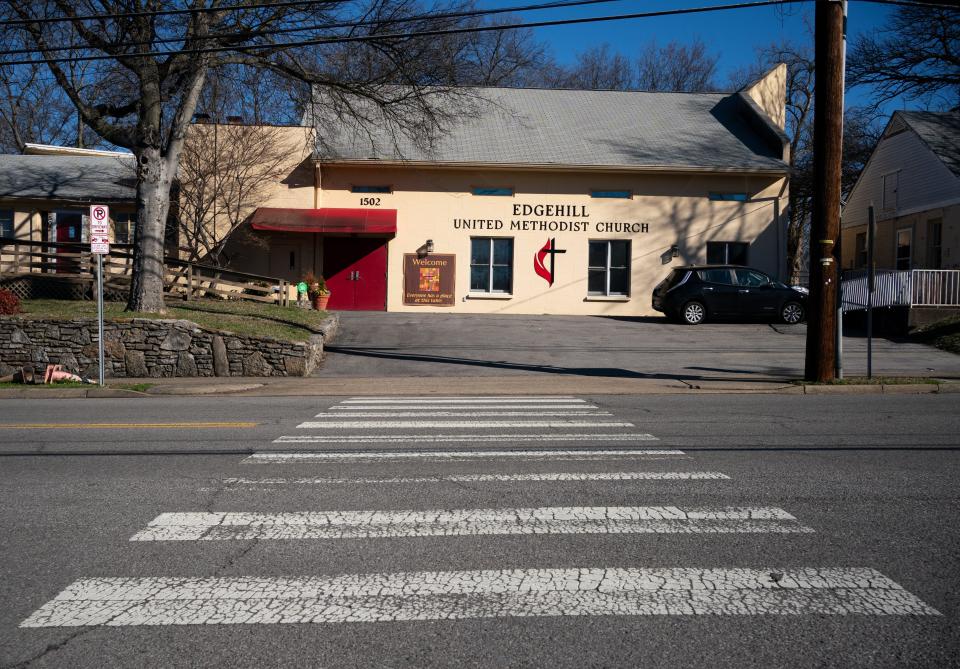
Even Edgehill UMC is coming to new understandings of its service to the community, as more churches embody a similar mission and values.
“For years, we were the only place in town where people truly felt welcome,” Feldhacker said. "Now people have choices, which is the great news, but it also means our boom years of being the only safe place in town are over.”
While still a home to LGBTQ+ members and congregants of color, Edgehill has aged and grown more homogenous over time. The church’s advocacy against anti-LGBTQ+ restrictions is less forceful and public than some neighboring Reconciling congregations.
Edgehill UMC is no longer the tip of the spear. Past and present leaders say the church wasn’t driven by a desire for notoriety, but rather to serve populations it saw in need.
Likewise, the church is providing new kinds of ministry services today, such as a hospitality ministry to immigrants and refugees. By virtue of that innovation, Edgehill UMC is the same church it was 40 years ago when it helped inspire a denomination-wide social movement.
“The founding congregation was passionate about inclusion,” Feldhacker said. “To this day, this congregation is immediately in consensus to passionately care for whoever is the underdog, whoever has less power."
Liam Adams covers religion for The Tennessean. Reach him at ladams@tennessean.com or on social media @liamsadams.
This article originally appeared on Nashville Tennessean: What's next for pro-LGBTQ movement in UMC after conservative exodus

